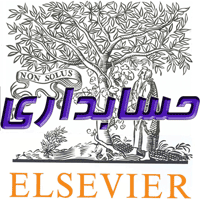دانلود مقاله isi بررسی قضاوت حسابداران در گزارش های مالی
دانلود رایگان مقاله الزویر در مورد بررسی قضاوت حسابداران در گزارش های مالی (کلیک کنید)
توضیحات :
وبسایت مکاله اقدام به ارائه پروژه ی ساینس دایرکت با فرمت pdf، از انتشارات الزویر برای رشته حسابداری، و با عنوان تاثیر راهنمایی ارائه شده برای قضاوت حسابداران در گزارش های مالی بین المللی، نموده است.
مشخصات این مقاله :
عنوان مقاله :
Impacts of Additional Guidance Provided on International Financial Reporting Standards on the Judgments of Accountants
ترجمه فارسی عنوان :
تاثیر راهنمایی اضافی ارائه شده برای قضاوت حسابداران در گزارش های مالی بین المللی
سال انتشار : 2014
متعلق به مجله یا ژورنال : مجله بین المللی حسابداری -The International Journal of Accounting
فرمت: PDF
تعداد صفحات: 26
شماره پروژه: 5056
کلمات کلیدی :
Decision aids, Accounting standards, Additional guidance, Complex task, Judgments
ابزار تصمیم گیری، استاندارد های حسابداری، راهنمایی اضافی، فرآیند پیچیده، قضاوت
چکیده :
Abstract
This pioneering study examines the impact of the provision of additional guidance on International Financial Reporting Standards (IFRS) as a “decision aid” on the accuracy of judgments of the accountants. To extend the prior research on accounting judgment and decisionmaking, we also examine the interactive effects of task complexity and additional guidance on the judgments of accountants. The results provide evidence that those accountants who are provided with decision aid in the form of additional guidance on IFRS make more accurate judgments than accountants who are not provided with such guidance. Furthermore, the study provides evidence that this additional guidance improves the judgments of accountants when they undertake tasks which they find complex. The results indicate that additional guidance on IFRS needs to be provided and suggests that accountants should exploit any guidance which is currently provided in IFRS and by the International Financial Reporting Standards Interpretations Committee.
مقدمه مقاله بررسی قضاوت حسابداران در گزارش های مالی :
Introduction
Judgment and decision-making is considered to be a critical activity in all organizations.Prior studies in psychology and auditing have provided evidence that the use of “decision aids” has the ability to influence the judgments of individuals and the decisions they make(see Ashton & Ashton, 2007; Bonner, 2007 for a review of these studies). Rohrmann (1986, p.365) defines a decision aid as “any explicit procedure for the generation, evaluation and selection of alternatives (courses of action) that is designed for a practical application and multiple use.” Decision aids are considered to have positive effects on the quality of cognitive processing, information search, problem solving, and accuracy in judgments and decision-making (Bonner, 2007).
The fact that interpreting and applying International Financial Reporting Standards (IFRS) is an integral part of the profession means that it is crucial to examine whether some form of decision aid could enhance the accuracy of judgments of the accountants, because low quality judgments can lead to serious economic consequences for the users of accounting information, as well as for firms.
An understanding of this is important because accounting decision-makers in today’s world are characterized as people who deal with huge amounts of information and need to solve complex tasks with multiple goals by applying regulations (Bonner, 2007; Rahahleh & Siam,2009). These elements of an accountant’s task can potentially lead to lower quality judgments. IFRS are developed using the International Accounting Standards Board (IASB) Framework. Hodgdon, Hughes, and Street (2011, p.416) pointed out that IFRS include less interpretive and implementation guidance than some national standards (including US
GAAP); hence, many aspects of financial reporting are based upon the judgments underlying the application of IFRS. To assist IFRS users in the interpretation and application of IFRS, an International Financial Reporting Standards Interpretations Committee (IFRSIC) has been set up. IFRSIC provides interpretative guidance by applying a principles-based approach founded
on the IFRS Conceptual Framework and as established in relevant IFRS. However, the support provided by IFRSIC in the interpretation and application of IFRS is not perceived as sufficient, and the committee has received regular requests from IFRS users for additional guidance on accurately interpreting and applying IFRS (Deloitte, 2008, 2011).
The complexity of accounting standards is seen as another barrier in the interpretation and application of IFRS (Jermakowicz & Gornik-Tomaszewski, 2006; Jermakowicz, Kinsey, & Wulf, 2007; KPMG, 2006; Larson & Street, 2004). Larson and Street (2004)
discovered that due to insufficient guidance on the interpretation and application of IFRS,first-time adopters of IFRS found the application of the standards very complicated. To address these concerns, Schipper (2003, 2005) suggested that detailed implementation guidance should be provided to entities when converting to IFRS. Hence, the complexity involved in the application of IFRS and the lack of implementation guidance provided by IFRSIC clearly signify the need for additional guidance on IFRS.
توجه :
– این مقاله به صورت کامل و با فرمت پی دی اف آماده خرید اینترنتی و دانلود آنی میباشد.
توضیحات بیشتر در مورد پروژه :
در این مقاله خواهید خواند که راهنمایی اضافی در استاندراد های بین المللی گزارش گیری مالی (IFRS) به عنوان یک ابزار تصمیم گیری برای قضاوت دقیق و صحیح حسابداران چه تاثیری دارد. همچنین نتایج نشان می دهد که در حال حاضر حسابداران باید از راهنمایی اضافی در IFRS و استاندارد های کمیته بین المللی گزارش گیری مالی بهره برداری کنند.
دانلود رایگان مقاله الزویر در مورد بررسی قضاوت حسابداران در گزارش های مالی (کلیک کنید)

